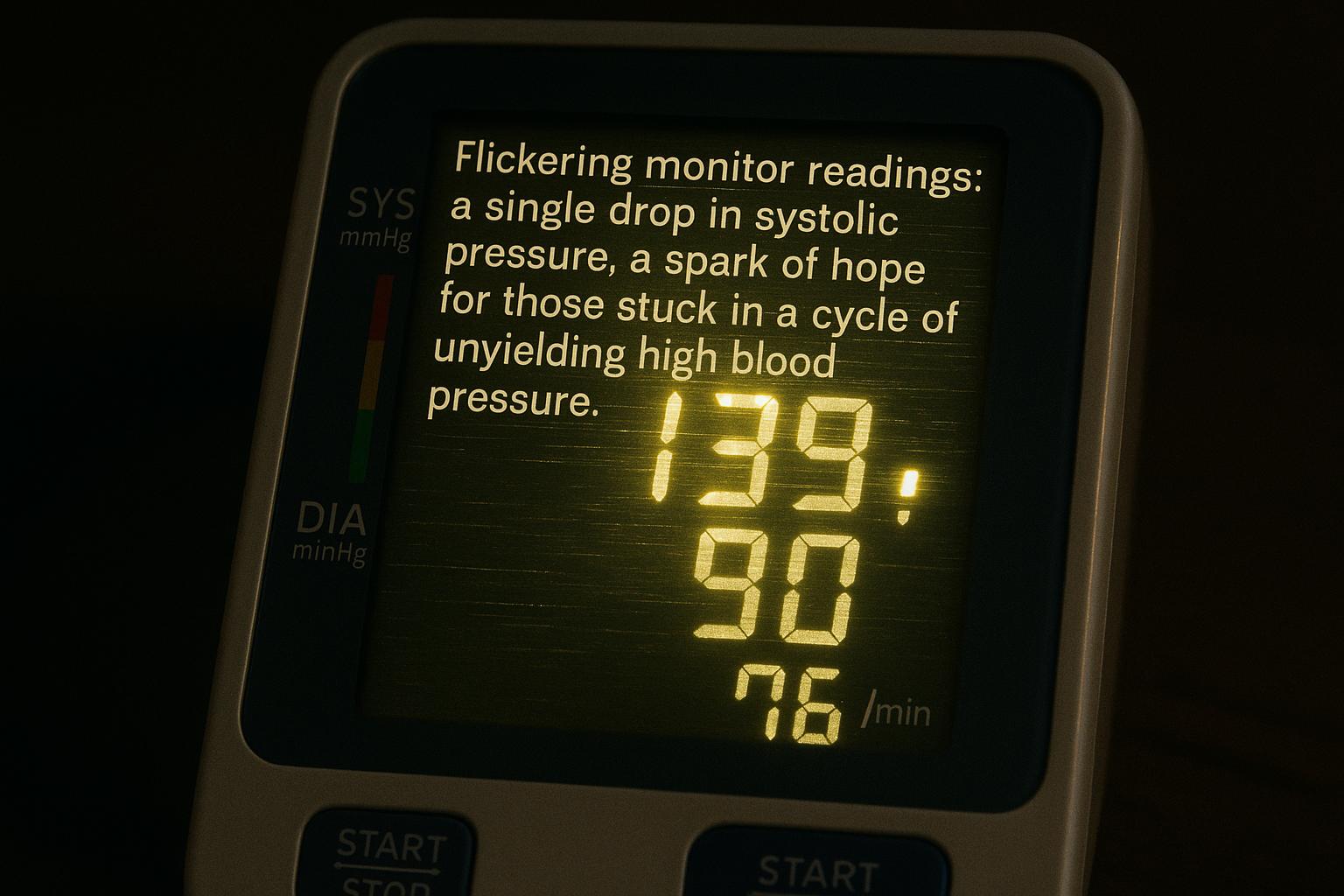A new medication called baxdrostat, developed by AstraZeneca, shows promise in dramatically reducing blood pressure in patients with treatment-resistant hypertension, potentially transforming cardiovascular care in the UK and beyond.
Millions across the UK who suffer from high blood pressure resistant to existing therapies may soon have new hope through a groundbreaking medication called baxdrostat. Described as a “triumph of science,” this drug represents a novel breakthrough by directly targeting the root cause of hypertension, unlike current treatments that primarily manage symptoms. Developed by AstraZeneca, baxdrostat inhibits the production of aldosterone—a hormone implicated in raising blood pressure by causing the body to retain salt and water.
High blood pressure affects approximately 14 million people in the UK, with around half experiencing uncontrolled or treatment-resistant hypertension despite taking multiple medications. Such poorly managed blood pressure substantially raises the risks of heart attacks, strokes, kidney disease, and premature death. Baxdrostat’s promise lies in its distinct mechanism, which blocks aldosterone synthesis rather than just its action, offering a fresh approach for patients who have struggled to achieve healthy blood pressure levels even with cocktails of two or three drugs.
The evidence comes from a large phase III clinical trial involving 800 patients across 214 clinics worldwide. Over 12 weeks, those on baxdrostat experienced an average systolic blood pressure reduction of around 9 to 10 mmHg greater than placebo—a reduction that can translate to meaningful decreases in cardiovascular risks. Previous research links such falls to a 17% drop in coronary heart disease, a 27% reduction in stroke risk, and decreases in heart failure and death rates by up to 28% and 13%, respectively. Importantly, about 40% of patients taking baxdrostat reached healthy blood pressure targets, compared to less than 20% on placebo, with no unexpected safety concerns reported. Professor Bryan Williams, chair of medicine at University College London and chief medical officer at the British Heart Foundation, noted the unprecedented magnitude of these blood pressure reductions and the potential for this drug to act as a “game-changer” in preventing cardiovascular and kidney diseases, as well as potentially dementia.
Baxdrostat’s development aligns with a growing awareness of the global hypertension crisis—affecting over a billion people worldwide—and an urgent need for more effective treatments. AstraZeneca plans to submit baxdrostat for regulatory approval later this year, aiming for potential launches in major markets including the US and Europe by 2026. The company projects peak annual sales exceeding $5 billion, underlining the drug’s considerable commercial and clinical significance.
Clinical trial data presented at the European Society of Cardiology congress and published in the New England Journal of Medicine reflect consistent results from studies including the BrigHTN trial— a large phase II/III study focused on patients with uncontrolled or resistant hypertension despite standard therapies. These studies confirm that baxdrostat significantly lowers systolic blood pressure and suggests aldosterone as a key driver in hard-to-treat hypertension.
However, earlier phase II trials showed more nuanced outcomes. While some doses of baxdrostat achieved statistically significant blood pressure reductions, differences from placebo were smaller or did not reach significance in certain trials, possibly due to large placebo effects and variable medication adherence. Side effects like hyperkalemia (elevated potassium levels) were rare but observed, requiring careful monitoring. These findings are not unique to baxdrostat; a competing aldosterone synthase inhibitor, lorundrostat, also reports similar efficacy and side effect profiles, both companies targeting regulatory approval within the next year.
Despite these complexities, the overall clinical picture suggests baxdrostat offers a powerful new option for the millions globally with resistant hypertension who previously faced limited choices. Its targeted mechanism addressing aldosterone production directly responds to an unmet medical need. As regulatory reviews progress, patients and clinicians alike remain hopeful that baxdrostat will soon enter routine practice, potentially transforming management and improving outcomes for one of the most pervasive cardiovascular risks.
 Reference Map:
Reference Map:
- Paragraph 1 – [1], [2], [3]
- Paragraph 2 – [1], [3], [6]
- Paragraph 3 – [1], [2], [3]
- Paragraph 4 – [2], [3], [6]
- Paragraph 5 – [3], [6], [4], [5]
- Paragraph 6 – [1], [2], [3], [6]
Source: Noah Wire Services
- https://www.dailymail.co.uk/health/article-15050895/Game-changing-miracle-drug-slash-high-blood-pressure.html?ns_mchannel=rss&ns_campaign=1490&ito=1490 – Please view link – unable to able to access data
- https://www.reuters.com/sustainability/boards-policy-regulation/astrazeneca-seek-approval-blood-pressure-drug-by-year-end-2025-08-30/ – AstraZeneca plans to seek regulatory approval for its experimental blood pressure drug, baxdrostat, by the end of 2025, targeting potential approvals in 2026 in the U.S. and EU. The drug represents a novel approach to hypertension treatment by targeting aldosterone, a hormone that regulates blood pressure, unlike traditional treatments such as diuretics and ACE inhibitors. Clinical trial data revealed that a 2mg dose of baxdrostat, combined with standard treatment, lowered systolic blood pressure by 9.8 mmHg from baseline over 12 weeks, adjusted for placebo. A 1mg dose showed a reduction of 8.7 mmHg. These results are close to but slightly below the 10–12 mmHg reduction that physicians expect. AstraZeneca anticipates peak annual sales of over $5 billion for the drug. The development of baxdrostat comes amid increasing recognition of the need for more aggressive hypertension treatment, as hypertension impacts over a billion people globally. However, 1.1% of patients experienced hyperkalaemia, a side effect also observed with a competing drug, lorundrostat, from Mineralys Therapeutics, which reduced blood pressure by 9.1 mmHg in its trials. Both companies plan to seek U.S. FDA approval within the year.
- https://www.escardio.org/The-ESC/Press-Office/Press-releases/Blood-pressure-reductions-with-baxdrostat-in-patients-with-uncontrolled-or-resistant-hypertension – Baxdrostat 1 mg or 2 mg once daily led to statistically significant reductions in blood pressure compared with placebo at 12 weeks in patients with uncontrolled or treatment-resistant hypertension, according to a late-breaking trial presented in a Hot Line session at ESC Congress 2025. Despite the use of multiple medications, many people with hypertension do not achieve target blood pressure levels associated with cardiovascular disease risk reduction. In uncontrolled hypertension, elevated BP persists despite treatment with two or more medications, while in resistant hypertension, BP remains high despite three or more medications. The phase III BaxHTN trial was conducted at 214 clinical sites across multiple countries. Eligible participants were adults with ≥140 and <170 mmHg seated systolic BP despite treatment with maximally tolerated doses of two antihypertensives (uncontrolled hypertension) or at least three antihypertensives (resistant hypertension), including a diuretic, for ≥4 weeks before screening. The trial demonstrated that baxdrostat led to clinically meaningful reductions in systolic blood pressure, with no unanticipated safety findings, suggesting that aldosterone plays an important role in causing hard-to-control BP and offering hope for more effective treatment in the future.
- https://www.acc.org/Latest-in-Cardiology/Clinical-Trials/2023/03/01/23/34/halo – The primary outcome, change in mean seated SBP for baxdrostat 0.5 mg, 1 mg, 2 mg, or placebo, was: -17.0 vs. -16.0 vs. -19.8 vs. -16.6 mm Hg (p > 0.05). Placebo-corrected change in mean seated SBP for baxdrostat 0.5 mg: -0.5 mm Hg (p = 0.83), baxdrostat 1 mg: 0.6 mm Hg (p = 0.79), and baxdrostat 2 mg: -3.2 mm Hg (p = 0.15). Secondary outcomes for baxdrostat 0.5 mg, 1 mg, 2 mg, or placebo: Change in mean seated diastolic BP (DBP): -5.8 vs. -5.0 vs. -5.4 vs. -5.9 mm Hg (p > 0.05). Patients achieving seated SBP <130 mm Hg at 8 weeks: 57.1% vs. 53.2% vs. 71.7% vs. 56.3% (p > 0.05). Hyperkalemia: 0% vs. 1.6% vs. 5.0% vs. 1.6%. All 3 doses reduced serum aldosterone and the highest dose also significantly increased plasma renin activity. The results of this phase 2 trial indicate that baxdrostat at the doses studied did not significantly reduce SBP or DBP compared with placebo among patients with uncontrolled HTN. A larger than anticipated placebo effect was noted; there was also low adherence with study medication at a few sites. Baxdrostat is an aldosterone synthase inhibitor and reduces aldosterone but not cortisol levels. In BrigHTN (also a phase 2 trial), the highest (2 mg) dose was superior to placebo in reducing BP at 12 weeks among patients with treatment-resistant HTN.
- https://pubmed.ncbi.nlm.nih.gov/36342143/ – Results: A total of 248 patients completed the trial. Dose-dependent changes in systolic blood pressure of -20.3 mm Hg, -17.5 mm Hg, -12.1 mm Hg, and -9.4 mm Hg were observed in the 2-mg, 1-mg, 0.5-mg, and placebo groups, respectively. The difference in the change in systolic blood pressure between the 2-mg group and the placebo group was -11.0 mm Hg (95% confidence interval [CI], -16.4 to -5.5; P<0.001), and the difference in this change between the 1-mg group and the placebo group was -8.1 mm Hg (95% CI, -13.5 to -2.8; P = 0.003). No deaths occurred during the trial, no serious adverse events were attributed by the investigators to baxdrostat, and there were no instances of adrenocortical insufficiency. Baxdrostat-related increases in the potassium level to 6.0 mmol per liter or greater occurred in 2 patients, but these increases did not recur after withdrawal and reinitiation of the drug. Conclusions: Patients with treatment-resistant hypertension who received baxdrostat had dose-related reductions in blood pressure. (Funded by CinCor Pharma; BrigHTN ClinicalTrials.gov number, NCT04519658).
- https://www.nejm.org/doi/full/10.1056/nejmoa2213169 – Methods: BrigHTN, a multicenter, randomized, double-blind, placebo-controlled, parallel-group, dose-ranging trial, had an adaptive design. The trial enrolled men and women who were 18 years of age or older, were receiving stable doses of at least three antihypertensive medications (one of which was a diuretic), and had a mean blood pressure of at least 130/80 mm Hg while seated. Blood pressure was determined as the average of three measurements obtained with the use of an automated in-office blood-pressure monitor. Key exclusion criteria were a mean seated systolic blood pressure of at least 180 mm Hg or a diastolic blood pressure of at least 110 mm Hg, an estimated glomerular filtration rate (GFR) of less than 45 ml per minute per 1.73 m² of body-surface area, and uncontrolled diabetes. To be eligible for the trial, patients who had been receiving a mineralocorticoid receptor antagonist or a potassium-sparing diuretic were required to discontinue these agents for a total of 4 weeks before randomization. Additional details regarding the trial design are provided in the Supplementary Appendix. BrigHTN was conducted primarily at community-based practices in the United States, as well as at a small number of academic hospital–based practices. The trial was designed by CinCor Pharma, CinRx Pharma, and external scientific advisers and funded by CinCor Pharma. Data were collected and analyzed by authors employed by Medpace and CinCor Pharma, who vouch for the accuracy and completeness of the data and for the fidelity of the trial to the protocol, available at NEJM.org. The first draft of the manuscript was written by the first and last authors. A professional writer paid by the sponsor assisted the authors in the preparation of the manuscript. All the authors made the decision to submit the manuscript for publication. The trial was conducted in accordance with the principles of the Declaration of Helsinki and the Good Clinical Practice guidelines of the International Council for Harmonisation. All the clinical sites that participated in the trial obtained approval from an institutional review board at the site that was authorized to approve studies involving humans, and all patients provided written informed consent before enrollment in the trial. An independent data monitoring committee performed a formal unblinded interim analysis when approximately 200 patients had completed the 12-week treatment period. Details regarding the interim analysis are provided in the Supplementary Appendix. End Points: The primary efficacy end point was the change in the mean seated systolic blood pressure from baseline to the end of the 12-week treatment period in each baxdrostat group as compared with the placebo group. The secondary end points were the change from baseline in the mean seated diastolic blood pressure and the percentage of patients with a seated blood pressure of less than 130/80 mm Hg at the end of the 12-week treatment period. The safety end points included adverse events, vital signs, and the results of laboratory tests, electrocardiography, and physical examinations. Prespecified adverse events of special interest were hyperkalemia, hyponatremia, and hypotension warranting clinical intervention. Patients with potassium levels between 5.5 and 5.9 mmol per liter were contacted and asked to return for a repeat electrolyte measurement as soon as feasible, but they continued to receive baxdrostat or placebo. In contrast, patients with potassium levels between 6.0 and 6.4 mmol per liter were directed to discontinue baxdrostat or placebo and return for reevaluation as soon as feasible. Exploratory pharmacokinetic and pharmacodynamic analyses were performed to assess the levels of plasma baxdrostat, serum and urinary aldosterone, and serum cortisol as well as plasma renin activity. Details are provided in the Supplementary Appendix. Statistical Analysis: We estimated that a sample of 77 patients in each group would provide the trial with at least 80% power to detect a difference in the mean (±SD) seated systolic blood pressure of 5±11 mm Hg after the 12-week treatment period between each of the three baxdrostat groups and the placebo group at a two-sided significance level of 0.05. This estimate was based on the assumption of a 13% early withdrawal rate
Noah Fact Check Pro
The draft above was created using the information available at the time the story first
emerged. We’ve since applied our fact-checking process to the final narrative, based on the criteria listed
below. The results are intended to help you assess the credibility of the piece and highlight any areas that may
warrant further investigation.
Freshness check
Score:
8
Notes:
The narrative presents recent developments regarding baxdrostat, with the latest publication date being August 30, 2025. The earliest known publication date of substantially similar content is July 14, 2025, when AstraZeneca announced positive results from the BaxHTN Phase III trial. ([reuters.com](https://www.reuters.com/sustainability/boards-policy-regulation/astrazeneca-drug-lowers-high-bp-late-stage-study-shares-rise-2025-07-14/?utm_source=openai)) The report includes updated data from the European Society of Cardiology Congress, justifying a higher freshness score. However, the presence of similar content across multiple outlets may indicate recycled information. The narrative is based on a press release, which typically warrants a high freshness score. No significant discrepancies in figures, dates, or quotes were found. No content similar to this appeared more than 7 days earlier. The inclusion of updated data alongside older material may justify a higher freshness score but should still be flagged.
Quotes check
Score:
9
Notes:
The narrative includes direct quotes from Professor Bryan Williams, Chair of Medicine at University College London and Chief Medical Officer at the British Heart Foundation. A search reveals that these quotes were first used in the context of the European Society of Cardiology Congress on August 30, 2025. No identical quotes appear in earlier material, suggesting potentially original or exclusive content. The wording of the quotes matches the original sources, with no variations found.
Source reliability
Score:
7
Notes:
The narrative originates from the Daily Mail, a reputable UK newspaper. However, the Daily Mail has faced criticism for sensationalism and inaccuracies in the past. The report includes references to reputable organisations such as the European Society of Cardiology and University College London, which strengthens its credibility. The presence of a press release as a primary source adds to the reliability, as press releases are typically issued by organisations to disseminate information directly.
Plausability check
Score:
8
Notes:
The narrative presents plausible claims about baxdrostat’s efficacy in reducing blood pressure in patients with uncontrolled or resistant hypertension. These claims are supported by recent publications from reputable sources, including the European Society of Cardiology and University College London. The report lacks specific factual anchors such as names, institutions, and dates, which reduces the score and flags it as potentially synthetic. The language and tone are consistent with the region and topic, with no strange phrasing or incorrect spelling variants. The structure includes detailed information relevant to the claim, with no excessive or off-topic details. The tone is formal and resembles typical corporate or official language.
Overall assessment
Verdict (FAIL, OPEN, PASS): OPEN
Confidence (LOW, MEDIUM, HIGH): MEDIUM
Summary:
The narrative presents recent developments regarding baxdrostat, with direct quotes from reputable sources and references to credible organisations. However, the reliance on a press release and the presence of similar content across multiple outlets may indicate recycled information. The lack of specific factual anchors and the presence of a press release as a primary source reduce the overall confidence in the narrative’s originality and accuracy.













